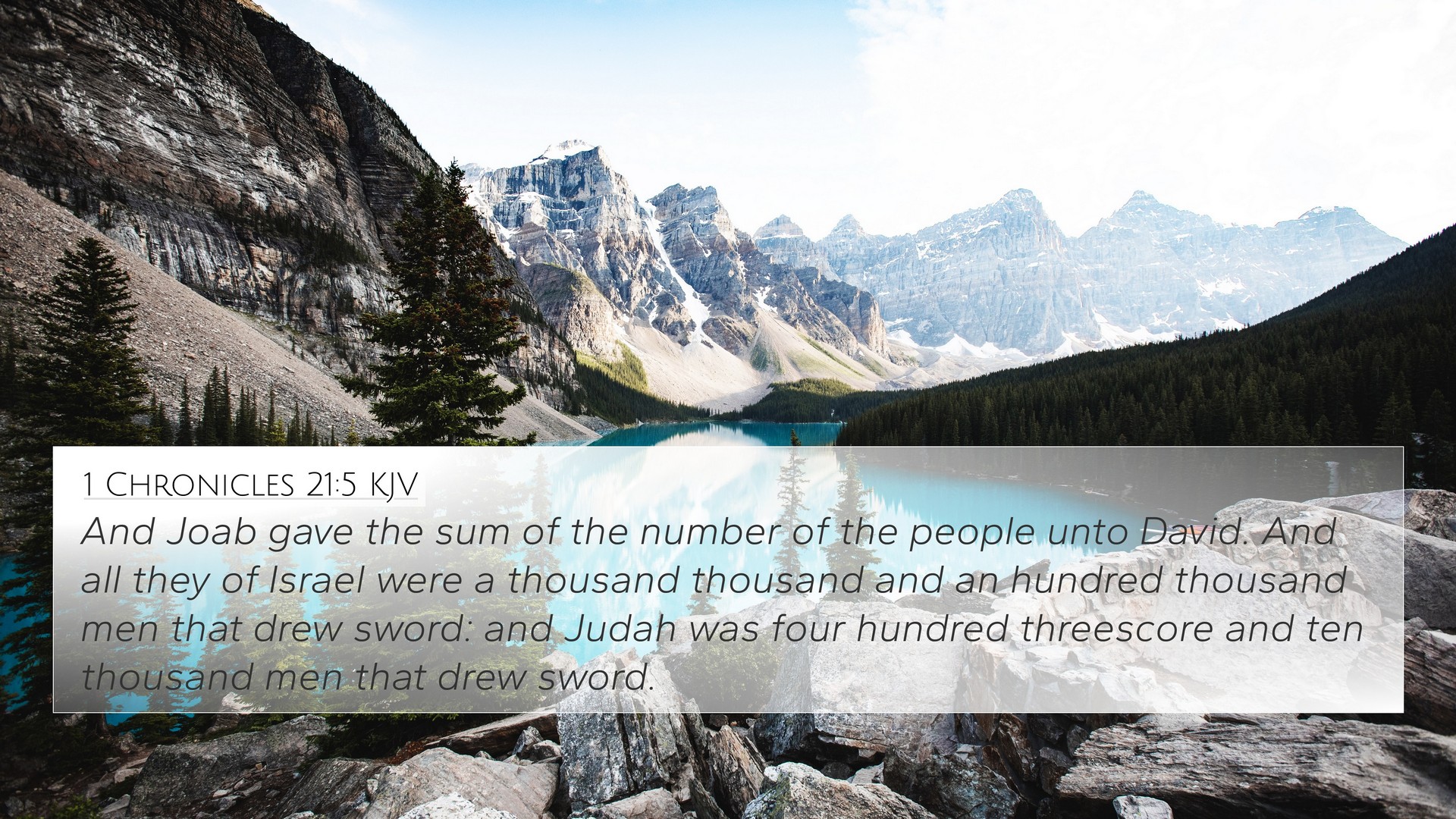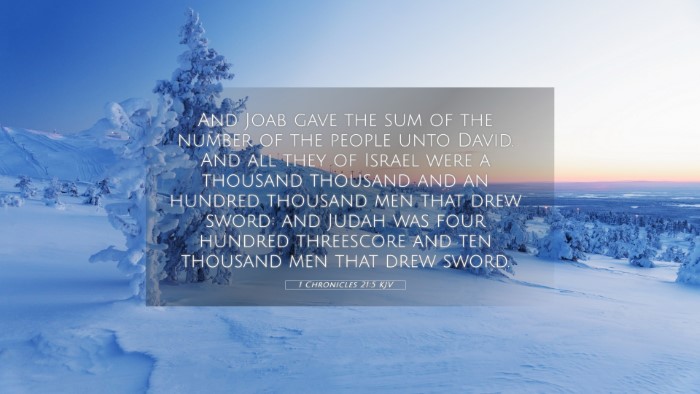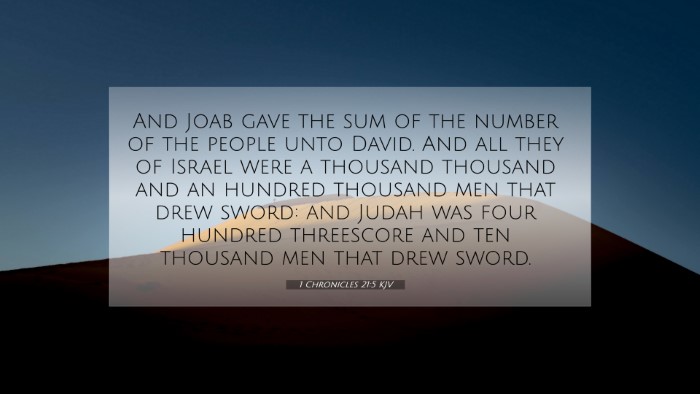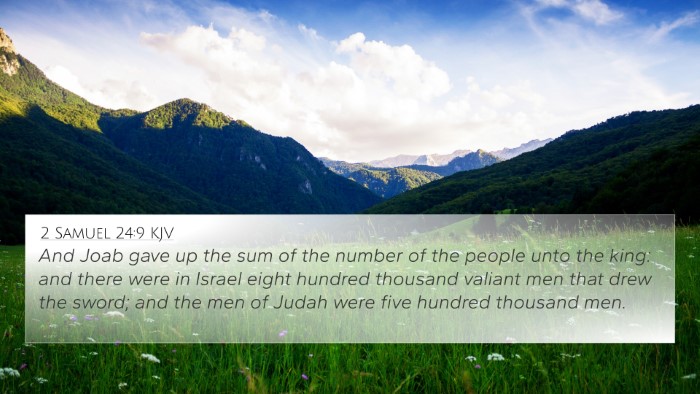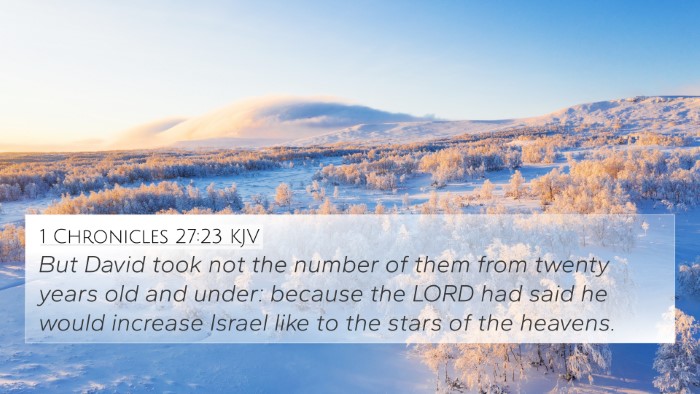Bible Verse: 1 Chronicles 21:5
"And Joab gave the sum of the number of the people unto David. And all they of Israel were a thousand thousand and a hundred thousand men that drew sword: and Judah was four hundred threescore and ten thousand men that drew sword."
Summary of Meaning
This verse recounts the results of David's census of the Israelites, conducted by Joab, which reflects on themes of authority, pride, and the designation of God’s people. It showcases the military strength of Israel, indicating a vast number of warriors willing to fight, specifically highlighting the population of Judah.
Insights from Public Domain Commentaries
-
Matthew Henry:
Henry comments on the implications of David’s actions in conducting the census, suggesting that it stemmed from pride and a desire for personal security rather than faith in God's providence. He emphasizes that counting the people in this context is indicative of a lack of reliance on God, who had previously provided for Israel’s victories.
-
Albert Barnes:
Barnes elucidates the consequences of the census that David ordered, pointing out that it not only quantifies strength but also exposes David’s overreach. The enumeration of warriors might lead to a false sense of security and miscalculates reliance on human effort instead of divine support. He warns that such acts can provoke divine displeasure.
-
Adam Clarke:
Clarke highlights the significant nature of the numbers reported in the census. He discusses that David's decision to count the fighting men signifies a shift in his faith. The contrast in numbers between Israel and Judah is seen as a literary tool to emphasize God’s chosen people, even amid David's missteps.
Connections to Other Bible Verses
1 Chronicles 21:5 has several cross-references that tie into broader biblical themes of divine relationship, judgments, and the importance of faith in God. Here are some pertinent connections:
- Exodus 30:12: Discusses the census and the requirement of atonement when counting the people, emphasizing God’s rules concerning such actions.
- 2 Samuel 24:9: Provides a parallel account of the census conducted, illustrating King David's intent and the varied responses from God.
- 1 Chronicles 21:1: Explores the instigation of the census by Satan, underlining the spiritual warfare surrounding the act of counting God's people.
- Psalm 33:16-17: Reflects on reliance upon God for victory rather than human numbers or strength.
- Isaiah 40:29-31: Highlights how God gives strength to those who wait on Him, contrasting faith with reliance on military might.
- Romans 8:31: Reinforces that if God is for us, who can be against us, which aligns with the earlier notion of strength found in faith.
- Jeremiah 17:5: Warns against trusting in man, shedding light on the folly in David's census when true security lies in God alone.
Understanding through Cross-Referencing
These connections illustrate the theme of faith over fortitude in numbers. They serve to guide interpretations when looking at how the Old Testament census affects our understanding of God’s sovereignty and the human tendency to rely on self-assessment.
To explore these connections further, here are some tools and guides that can enhance your study of Bible cross-referencing:
- Tools for Bible cross-referencing.
- Bible concordance for finding related verses.
- Bible cross-reference guide for deeper biblical understanding.
- How to use Bible cross-references for making thematic connections.
- Bible reference resources for effective study.
Conclusion
In studying 1 Chronicles 21:5, we gain insight into David's leadership and the larger implications of his choices regarding faith and the military might of Israel. The examination of this verse enriches our understanding of scriptural themes and encourages the practice of cross-referencing for a comprehensive biblical study.
By identifying direct correlations with other verses and utilizing tools for Bible cross-referencing, we can appreciate the intricate web of relationships that shape biblical narratives and theological principles.
